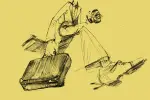Your first interview is a rite of passage, but it’s not one that everyone enjoys. When I was 17, I was faced with my first interview, and I got my first job at a local cheesesteak shop. I had applied to 10 other part-time jobs, but I didn’t hear back from any of them — not even a rejection email.
The summer before my senior year of high school was almost over, and I still had no job experience. I was about to throw in the towel and accept that I’d become a barefoot housewife who can’t cook, when my mom’s acquaintance from high school posted a job opening on Facebook. This was my shot.
Feel free to judge me for this next part, because I sure do. The restaurant was hidden in a nook between two highways, so I drove around for 45 minutes utterly lost, and eventually, I arrived 15 minutes late. Not only that, but it was summer, so I showed up in shorts and flip-flops. Admittedly, I looked good, but not professional.
I didn’t prepare either. When the woman conducting the interview asked why I wanted to work there, I blanked. Because I wanted money? Because society expected me to get a summer job during high school? Overall, it was a complete disaster, and if the owner wasn’t doing my mom a favor, I would have had to add an eleventh rejection to my list.
Since then, I vowed to never be so ignorant again. As a junior in college, I’ve had my fair share of interviews for internships, and luckily, I was able to confidently pretend that I knew what I was doing. So, here are some tips on how to forgo the embarrassment and ace your phone/Skype or in-person interview.
1. Wardrobe
In-person
Your attire depends on the type of job you’re applying for. While it’s better to be overdressed rather than underdressed, the wrong outfit may suggest that you don’t understand the dynamic of the company.
Remember, interviews are based largely on first impressions, so dress to impress (ugh, how cheesy). Still do it, though. There are four general categories to consider when choosing your interview outfit.
Dress conservatively for big corporations, accounting firms, law offices, etc. Men, this means you should choose a black or grey suit, a striped or solid-colored tie, a belt, black socks and black shoes.
Women, a black, grey or navy pantsuit or skirt, flats or closed-toed heels that are no higher than three inches, minimal makeup and no more than five pieces of jewelry (each earring counts as one piece) will suffice.
Dress in business casual for sales, government, education, small companies, etc. Basically, business casual is your classic dress pants and a nice shirt. No blazer required. Men, you don’t need to wear a tie, but you can if you want to. Women, a pair of black pants and a sweater should get the job done.
Dress casually for any blue-collar job, like construction, landscaping, plumbing, etc. Wear whatever you feel comfortable in. Don’t show up in a dirty t-shirt and flip-flops, but a nice pair of jeans and a collared shirt would be perfect.
Get creative and dress fashionably for any job in the fashion, entertainment or music industry. These jobs are looking for your unique style and voice, so show them. There aren’t too many rules here, but don’t be inappropriate. You know, don’t dress like Meredith from “The Office” on casual Friday.
Phone/Skype
Obviously, you don’t have to dress a specific way for a phone interview; they can’t see you. However, some people find that dressing nicely boosts their confidence, hence helping them do better on their interview.
At the same time, don’t wear something that’s so stiff and uncomfortable that you’re going to be focused on it the whole time. Take a shower, do your hair, throw on some jeans and make sure you’re comfortable and confident.
A Skype interview is half and half. Literally. You only have to dress up half of yourself. Whenever my roommate has a Skype interview, she’s professional from the waist up, and she rocks her boyfriend’s gym shorts from the waist down.

Personally, this makes me uncomfortable because what if, for some reason, my bottom half comes into view? But again, it’s all about what you’re comfortable in.
Try to wear muted or solid colors for a Skype interview, though. Everyone looks a bit different on video than they do in person, and looking at a screen is tedious on the eyes. You don’t want your outfit to be distracting, so don’t wear something that will blend in with the background, but don’t wear something that is more exciting than what you’re saying either.
2. Preparation
In-person
You’re only as strong as your weakest answer. No matter how long you prepare, there’s bound to be a question you’re not prepared for. The most important thing to remember is that you’re allowed to take a second to think before you respond.
And, if your answer sucks, persevere and perfect the next one. I recently applied for a copywriter internship, and they asked me why marketing was important to me. Maybe I should have anticipated that question, but I didn’t, and I blundered. But, they still called me back for a second interview, and if I can make it to the second round, so can you.
There are a few typical questions that are always asked. “Tell us about yourself.” “Why do you want to work here?” “How did you hear about us?” “Do you have any questions?” No matter what interview, at the very minimum, prepare these four answers ahead of time. Memorize your answers, and don’t think you can wing it on the spot.
Those questions may seem straightforward, but they’re not. Think about what the company wants to hear, then say it. But, also be genuine, the kind of genuine that’s a good fit for their company. You need to walk a fine line, and that can be stressful, but here’s an article to help you answer the more common interview questions.
Most importantly, though, don’t forget to research the company. Scour the company website. Make sure you know exactly what they do, who their clients are and what they’re looking for in an employee. Showing knowledge about the company shows interest, and companies want to hire someone who’s interested in them, not someone who’s just looking for a job.
Phone/Skype
The reason I like phone interviews better than any other type is because I can have a cheat sheet. I can have a Word document with prepared answers written down on half of my computer screen, and the company’s website on the other half.
This way, I only have to prepare a good answer, and I don’t have to waste time memorizing it. Personally, when I prepare answers for a phone interview, I write them exactly how I would say them: A little casual, but not too uppity or over-professional.
For a Skype interview, you can’t do that because the interviewer will notice if you’re not making eye contact. You can have your cheat sheet with you, just in case, but you can’t stare at it the entire time. Glance at it only when you need to.
Worse comes to worst, be honest with the interviewer. Explain that you did research on the company, and you wrote it down, and you’re just checking your notes. Or say that you wrote down some questions that you didn’t want to forget to ask. This shows initiative, interest and preparedness, which are all positive qualities.
Generally, interviewing isn’t fun, but it’s a necessary means to a paycheck-filled end.

















